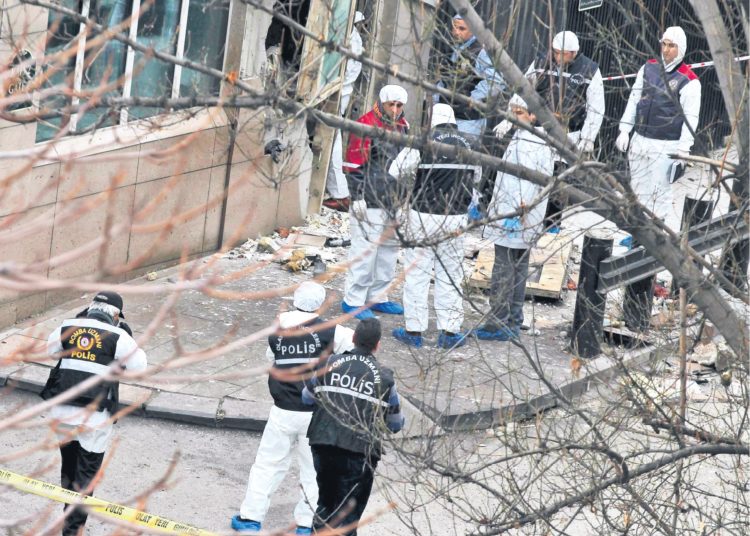Abdullah Bozkurt/Stockholm
The Turkish government deemed as wrongful an act by a police chief who in 2012 had ordered his subordinates to enhance security measures around the US Embassy building, the ambassador’s residence and other venues frequented by American citizens in the Turkish capital.
The bizarre and twisted revelations were uncovered in a 2015 disciplinary investigation report prepared by the Directorate of General Security (Emniyet), part of the Interior Ministry that oversees the police department and gendarmerie, Turkey’s main law enforcement agencies. In justifying the disciplinary actions taken against police chief Hamza Bayındır, then-head of the Ankara Police Department’s counterterrorism unit, Interior Ministry inspectors presented the 2012 order signed by Bayındır as evidence for his dismissal.
The order by Bayındır was issued on September 13, 2012 against the backdrop of the murder of US Ambassador Christopher Stevens and three of his colleagues in Libya a day before when a mob of protestors and gunmen angered over a film that ridiculed the Prophet Muhammad attacked the consulate in Benghazi.
The police chief was not acting on his own and was in fact complying with a circular issued on September 12 by the Emniyet, which had issued a nationwide alert after the Libya incident. Bayındır’s order made reference to that circular and asked police units to be on the lookout for indications of a possible attack against the US Embassy, consulates or American nationals. He asked for additional security measures and a review of existing ones and stressed the need to remain vigilant.
The order was on a need-to-know basis, and Bayındır told his team to inform the police units in person due to the sensitivity and urgency of the matter.
The police chief’s signature on the order that called for additional security measures around the US Embassy landed him in jail on fabricated charges:
What was a routine order for Bayındır, who did his job as counterterrorism chief in Ankara in line with Turkish laws and regulations, turned out to be a headache for him in the aftermath of 2013 corruption investigations that incriminated then-Prime Minister Recep Tayyip Erdoğan and his family members. Motivated by a vendetta and desire to punish police who had exposed his dirty laundry, Erdoğan launched a major purge of the country’s main law enforcement agency.
Baseless administrative investigations were conducted into veteran police chiefs to create a pretext for their dismissal from service, and later criminal probes were initiated. Bayındır was among those who were targeted by the government. In a 2015 administrative probe, his order to beef up security around the US Embassy, ambassador’s residence, consulate buildings and other venues against possible attacks was presented as evidence against him.
The inspection report, dated May 4, 2015 and signed Interior Ministry inspectors Kemal Fidan and Ertuğrul Namal, was later sent to the Ankara Chief Public Prosecutor’s Office to be incorporated into a criminal prosecution of Bayındır. Other documents he signed to obtain wiretap and surveillance authorizations from the courts in a confidential investigation into the Turkish network of the Islamic Revolutionary Guard Corps (IRGC) Quds Force, known as Tevhid Selam, were also presented to the court as if he had committed a criminal offense by doing what he was supposed to do.

The police chief was dismissed from his position in January 2014 and later purged from the police force. He was arrested in February 2016 along with other police chiefs for their role in the investigation of Quds Force cells in Ankara. The Quds Force investigation exposed the clandestine activities of Iranian intelligence in Turkey and incriminated senior pro-Iran Turkish government officials including two chief aides of President Erdoğan, who later killed the probe.
Bayındır was a highly respected and distinguished police chief who served in the police unit of the UN Mission in Kosovo (UNMIK) in the past. His team led the investigation into a deadly US Embassy attack by a DHKP/C militant on February 1, 2013 and worked together with the visiting FBI team in identifying the terror cell. The explosion occurred inside the security checkpoint at the side entrance to the embassy, where a suicide bomber detonated an explosive device. A guard standing outside the checkpoint was killed.
The cover and the last page of the disciplinary investigation report by Interior Ministry inspectors who listed Bayındır’s order for additional security measures around the US Embassy as if it were a criminal act:
The 51-year-old police chief has been in jail since December 2017 and was sentenced to seven years, six months in October 2020 on charges that he was affiliated with the Gülen movement, a critic of the government. He is also facing other charges, from attempting to oust the government to obtaining state secrets, in separate cases.
President Erdoğan brought Süleyman Soylu in as interior minister in August 2016, a fiercely anti-American figure who is responsible for the police and gendarmerie. Soylu was designated under sanctions by the US government in 2018 for his ministry’s role in the unlawful prosecution of US nationals. The sanction was later lifted after the release from prison of American pastor Andrew Brunson.













